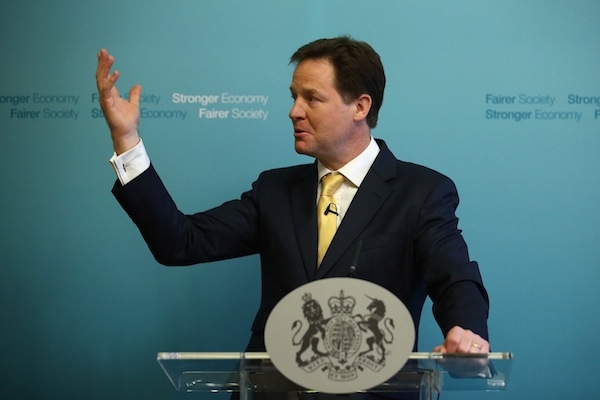If you think the battle in the Tory party over policies can get bloody, spare a thought for the Lib Dems, who have to listen to their members as well as the differing views of their MPs. I write about how Nick Clegg and his colleagues at the top of the party are trying to encourage grown-up decision-making in my Telegraph column today.
The problem for the Lib Dems – which they regard as a strength – is that their party structure gives members a great deal of final say over the manifesto content. A manifesto working group, led by David Laws, reports to the Federal Policy Committee, which decides party policy. The party conference will also discuss a ‘manifesto themes’ document this autumn, and vote on the party’s pre-manifesto next year. If this arrangement sounds confusing, it’s worth revisiting this excellent organogram of how the Lib Dems ‘work’ to see quite how fraught their policy-making process is.

The main conflict in the party at the moment, according to those pushing the grown-up line, is between pragmatists and idealists, rather than left and right. But there are still fissures between the two sides of the party that will cause problems at this autumn’s conference. The leadership has tried to control this too, by putting down its own motion on the economy, which the Federal Conference Committee has selected above two other motions from different ideological groups in the Lib Dems.
The first rival motion came from the influential Social Liberal Forum, a left-leaning group that claims to be the ‘soul’ of the Liberal Democrats, and has caused a number of problems for the leadership, most notably on the NHS reforms. It calls for ‘a major boost to public capital investment in order further to stimulate jobs and growth. The government must utilise low interest rates to raise capital for productive investment, especially affordable housing, and to allow councils greater freedom through prudential borrowing, to this end’. This wouldn’t be the most difficult thing for the leadership to address, as the Lib Dems have largely managed to steal the glory for the Coalition’s existing capital investment commitments. But the more difficult element of the motion is the point calling for ‘a distinctive Liberal Democrat approach to deficit reduction beyond 2015, with a better balance between tax rises and spending cuts, and greater emphasis on raising real incomes and growth’. It wasn’t accepted for conference, but SLF members are already planning to amend the leadership’s motion.Currently social liberals in the party bemoan the continuing unity in the Coalition over the economy, and want greater clarity. But I understand that while George Osborne has already spelt out his aim to balance the books after 2015 with spending cuts rather than tax rises, the Lib Dems don’t want to make any moves on this front yet.
There was also another motion from a rival party faction, called Liberal Reform, which bears greater resemblance to the leadership’s offering. They may wish to add their own amendments in September as well. But it will be next year, when the conference votes on the pre-manifesto, that the real battles break out, not just between pragmatists and idealists, but also between the left and right of the party.
The leadership knows, though, that some of those battles won’t be as powerful as they could be. Those around Clegg are reassured by the encouraging economic data and the continuing lack of evidence that raised tuition fees are putting students from poorer backgrounds off applying to university. They believe that this severely weakens the case both for idealistic manifesto-writing, as pragmatism hasn’t turned out all that bad in the end (in policy terms, perhaps, but not in terms of the long-standing political damage that breaking the fees pledge wrought on the party). And if the economy is improving, then it is much more difficult for left-leaning members to argue for an Ed-Balls-esque model of recovery. But the test for Clegg and co is whether their activists feel they are being listened to, or whether they decide to put up a fight over this new grown-up policymaking. Or indeed whether they feel offended to be told that they need grow up at all.







Comments